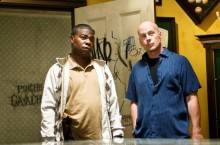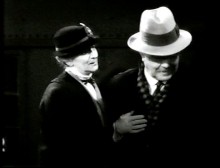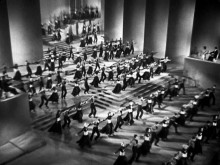Crankiness on the airwaves
This Wednesday at 6 p.m. I’ll be joining radio host David Hurand, Bold Life movie critic Marcianne Miller and Fine Arts Theatre manager Neal Reed for Hurand’s annual Oscar show on WCQS. For an hour, we’ll bat it around about who we think should win, who we think will win—and who we think was just plain robbed by the nominations. Violence may or may not ensue. Tune in and see … or hear at any rate.
In theaters
OK, so we got lucky last week with Shutter Island (see review in this week’s Xpress). It doesn’t follow that you should expect cinematic crocus popping up out of the snow this week. Far, far from it. We are reminded, instead, of the validity of Punxsutawney Phil’s prediction of more winter to come in the form of Kevin Smith’s Cop Out and Breck Eisner’s The Crazies. The former looks painfully bad and the latter merely looks kind of superfluous.

Cop Out offers us Bruce Willis and Tracy Morgan as NYPD detectives on the hunt for a rare baseball card that was stolen from Willis and with which Willis was planning on paying for his daughter’s wedding. High-speed high jinks and snappy patter are supposed to ensue. The trailer makes me somewhere on the very far side of enthused. I’m not surprised Kevin Smith took the job—he hasn’t exactly ignited the box office of late—but I’m curious as to why it was offered him. Smith’s entire appeal is based on his writing and his characters. This film features neither. Make of that what you will.
Back in 1973, George A. Romero made a little picture called The Crazies. It was kind of a variant on his Night of the Living Dead (1968), only this time it wasn’t zombies, but people turned into psychotic killers thanks to a military experiment that got out of control—and which the military then tries to contain. It was cheaply made, had the usual level of Romero socio-political criticism, but it never quite became one of his more respected pictures. Well, it’s back as a bigger-budgeted remake with a pretty respectable cast. And it looks OK, but I’m not really sold by the trailers as anything to get worked up about.

The new film was directed by Breck Eisner (son of Michael), who hasn’t made a feature since Sahara back in 2005—a film so thoroughly forgettable that I had to look it up to remember I’d reviewed it (I reviewed it as passably entertaining nonsense). I remember almost nothing about it, though I do remember the trailers with the announcer screaming, “Directed by Breck Eisner!” at the very end as if the name meant something. That this is the most memorable thing about Eisener’s last movie doesn’t fill me with hope about his new one. On the other hand, it looks better than Cop Out, but then so would the prospect of a Martin and Lewis double feature.
What I’m trying to convey in my subtle way is this: Shutter Island (Carmike, Carolina, Cinebarre, Epic, Biltmore Grande), The Last Station (Fine Arts) and The Oscar-Nominated Shorts (Carolina) opened last week. They’re all still in town. Crazy Heart (Carolina, Fine Arts, Co-ed Cinema), An Education (Carolina), A Single Man (Carolina), The Imaginarium of Dr. Parnassus (Carolina) and Sherlock Holmes (Carmike) are still around. Moviegoing times aren’t really lean enough for the new offerings.
On DVD

The Informant! comes out on DVD this week. If you missed it in theaters, it’s certainly worth a look. It probably won’t change your life, but it does entertain and pose the relevant question of how the polar bear knows its nose is black. I didn’t see Richard Kelly’s The Box, but Justin Souther found it at least interesting. The same is also true of Cirque du Freak: The Vampire’s Assistant. On the other hand, I did see Everybody’s Fine, and I assure you, they aren’t. No one locally went to see The Damned United. I’m not sure why. It’s a truly excellent film—even if you aren’t interested in soccer (which I am not). Maybe you’ll give it a shot on DVD. It deserves it. I didn’t like Sorority Row in the theater. I’m leaving the experience there.

Leo McCarey’s Make Way for Tomorrow (1937) comes out on DVD tomorrow, too. You’ve probably never even heard of this film. It came from Paramount Pictures (which hated the film). The thing is, McCarey never made a better picture. Considering that McCarey also made Duck Soup (1933), Ruggles of Red Gap (1935), The Awful Truth (1937) and Going My Way (1944)—to name but a few—that’s a pretty large statement. However, this little film starring Victor Moore and Beulah Bondi as an aging couple who lose their home and have to live with their children—none of whom will take both of them—is one of the finest and most moving examinations of the effects of poverty on old age ever made. It may be even more relevant now than it was in 1937. You need to see this film. Bring tissues.
Notable TV screenings
Yeah, there’s some good stuff this week There’s even some great stuff—The Third Man (1949) is on at 10:30 Wednesday morning and movies don’t get much greater than that—but there aren’t many rarities or hidden gems lurking in the listings. Strangely, however, one of the more interesting ones is actually on, wait for it, Fox Movie Channel.

H.E.A.L.T.H. 4 p.m., Thursday, Feb. 25, FMC
Robert Altman’s H.E.A.L.T.H (Happiness Energy and Longevity Through Health) was shot in 1979, released to disastrous reviews in 1980, buried for a couple years and then given a very limited run in 1982 before pretty completely just disappearing altogether. Even today, the film remains unavailable on DVD, making any showing noteworthy for Altman fans. I first caught the film in 1982 at an art-house theater on Eighth Street in Greenwich Village. At that time, I wasn’t that interested in Altman. (In fact, I was more curious about the film, because it had been shot at the Don Cesar Hotel on St. Pete Beach, where I’d been to conventions a few times in an earlier life when I was involved in the photography business.) In ‘82, I think the film more perplexed me than anything. It’s not so much that it was odd—though it’s certainly that—as it was that it was so laid-back, off-the-cuff and personal. If it was made “for” anybody it seemed to have been strictly for Altman and his friends. That may be true, too; it certainly was the reason it flopped. Now that has its own appeal. The story—such as it is—is merely a look in at a health convention that’s being covered by a hapless Dick Cavett (as himself), who tends to retire to his room and watch The Tonight Show. I suppose even that strikes him as preferable to people dressed up as carrots and the amazing displays of nut cases and corporate corruption swirling through the land-boom architecture of the hotel—not to mention Lauren Bacall as the world’s oldest virgin, who keeps floating off into catatonia in her capacity as figurehead of the H.E.A.L.T.H. movement. Is the film good? I’m not sure—and I haven’t seen it in years—but it’s definitely different.

Gold Diggers of 1935, 1:45 a.m., Sunday, Feb. 28, TCM
Perhaps because Busby Berkeley’s Gold Diggers of 1935 (1935) is so markedly inferior to Gold Diggers of 1933 (1933), it’s a film that is more often than not reduced to a single Berkeley production number, “Lullaby of Broadway.” That’s certainly understandable, and there’s no denying that the number in question is the highlight of the film (some say of Berkeley’s career). It’s also the damnedest thing he ever created, because it’s incredibly creepy—a kind of musical nightmare made up of weird angles, low-key lighting, looming shadows, a sense of sexual desperation and ending in the death of its central performer (Wini Shaw) when she falls from a skyscraper terrace. However, there are other points of interest—not the least of which is its peculiar hybrid status. Broadly speaking, musicals tend to break down into two categories: “pure” musicals and performance musicals. The difference being that in the pure musical the songs are integrated into the plot, while in the performance musical, they’re numbers that are being performed for an audience. The two often cross over, but the standard Berkeley musical is of the performance variety. Here you get both—and it’s not always a comfortable mix, but it is an interesting one. There’s also a somewhat unusual tone to the film in that—with the exception of the juvenile leads, Dick Powell and Gloria Stuart—no one is sympathetic and most of the cast is out to fleece the rest of the cast, nearly all of whom deserve it. Plus, there’s Adolphe Menjou as a thinly-veiled caricature of theatrical impresario Max Reinhardt, who Warner Bros. was spending a ton of money on with his A Midsummer Night’s Dream (1935). Worth a look.




Before you comment
The comments section is here to provide a platform for civil dialogue on the issues we face together as a local community. Xpress is committed to offering this platform for all voices, but when the tone of the discussion gets nasty or strays off topic, we believe many people choose not to participate. Xpress editors are determined to moderate comments to ensure a constructive interchange is maintained. All comments judged not to be in keeping with the spirit of civil discourse will be removed and repeat violators will be banned. See here for our terms of service. Thank you for being part of this effort to promote respectful discussion.